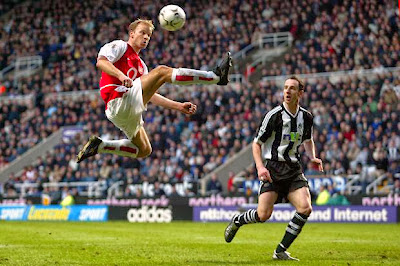The first one I saw prompted a response on here.
The Sky interviewer asked bluntly: Nature or Nurture?
The Sky interviewer asked bluntly: Nature or Nurture?
Bergkamp answers 'Both'.
In our world of football football football I think people forget that it's an artificial activity created by humans only about 200 years ago with no bearing to what humans need to be doing to survive. Its entertainment, and while it is probably the best form of it that's all it is.
The idea that people could be born footballers is ridiculous, and throws up some interesting points.
Football is a simple game born out of competition between men. It involves intelligence in certain areas, agility, strength, coordination. All of these are skills we use elsewhere in life, and it just so happens football needs the right balance of each to succeed. In fact different balances of these skills make it such a great sport, and mean it can be watched and played all year round by billions.
The footballers we worship on the pitch are the ones who have trained their skills to fit the 90 minutes on a 100 metre long pitch, and have had the determination and single-mindedness to devote their lives to it. I would argue there is very little between the top 1000 professional footballers in terms of their skill and movement on a pitch, such are the requirements for reaching the top of a game played for an hour and a half at the fastest pace possible.
We often forget that these guys are one out of maybe 100,000 kids who wanted to be footballers, and it falls to their coaches and family support at crucial stages to determine whether they reach right the academies aged 12 or not. Beyond this comes their skills with a football and stamina, and even further is their intelligence and role in a team.
Players like George Elokobi have hilariously unbalanced skill sets, in his case he's pure beef and can run a long way before he gets tired. Skill with a football is the only thing holding him back from champions league glory. Meanwhile players like Bergkamp and Edgar Davids spent more time with a football at their feet than running around and as a consequence were head and shoulders above the majority of players when it came to ball control, arguably the most basic attribute for professional footballers. These players made it to the top level through dedication to being the best they could humanly be at controlling a football, something which would have made them pretty boring to be around in any other situation.
Basically I'd argue you couldn't separate Elokobi and Bergkamp by their skills on the ball aged 2, but just 10 years down the line and its a different story.
In our world of football football football I think people forget that it's an artificial activity created by humans only about 200 years ago with no bearing to what humans need to be doing to survive. Its entertainment, and while it is probably the best form of it that's all it is.
The idea that people could be born footballers is ridiculous, and throws up some interesting points.
Football is a simple game born out of competition between men. It involves intelligence in certain areas, agility, strength, coordination. All of these are skills we use elsewhere in life, and it just so happens football needs the right balance of each to succeed. In fact different balances of these skills make it such a great sport, and mean it can be watched and played all year round by billions.
The footballers we worship on the pitch are the ones who have trained their skills to fit the 90 minutes on a 100 metre long pitch, and have had the determination and single-mindedness to devote their lives to it. I would argue there is very little between the top 1000 professional footballers in terms of their skill and movement on a pitch, such are the requirements for reaching the top of a game played for an hour and a half at the fastest pace possible.
We often forget that these guys are one out of maybe 100,000 kids who wanted to be footballers, and it falls to their coaches and family support at crucial stages to determine whether they reach right the academies aged 12 or not. Beyond this comes their skills with a football and stamina, and even further is their intelligence and role in a team.
Players like George Elokobi have hilariously unbalanced skill sets, in his case he's pure beef and can run a long way before he gets tired. Skill with a football is the only thing holding him back from champions league glory. Meanwhile players like Bergkamp and Edgar Davids spent more time with a football at their feet than running around and as a consequence were head and shoulders above the majority of players when it came to ball control, arguably the most basic attribute for professional footballers. These players made it to the top level through dedication to being the best they could humanly be at controlling a football, something which would have made them pretty boring to be around in any other situation.
Basically I'd argue you couldn't separate Elokobi and Bergkamp by their skills on the ball aged 2, but just 10 years down the line and its a different story.
















